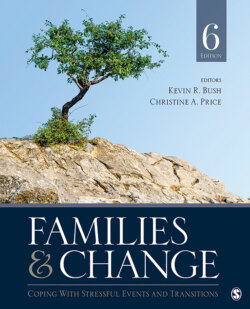Читать книгу Families & Change - Группа авторов - Страница 79
На сайте Литреса книга снята с продажи.
Parental Coping
ОглавлениеFrom a family stress and crisis perspective, coping goes beyond being a potential resource by describing how parents can actually manage, endure, and recover from stressors (Patterson, 2002). Instead of being a potential ability, the process of coping involves actively seeking to maintain the status quo or to achieve new levels of family organization. Coping by parents involves making actual responses to or redefining the circumstances at hand (Dewar, 2016; Jones et al., 2009). Specific coping strategies are not inherently adaptive or maladaptive, but are useful to a degree that depends on the precise nature of the circumstances that are faced (Dewar, 2016; Hennon et al., 2009; Patterson, 2002).
The process of coping that involves using available resources and the parents’ perceptions are conceptually distinct phenomena but often are interrelated in reality for many circumstances. The types of coping responses that parents use can vary with the specific stressor or crisis that is faced (Hennon et al., 2007; Hennon et al., 2008). For example, parents who face serious financial stress that can add to parenting distress, are better prepared to deal with this circumstance when they maintain positive self-evaluations, beliefs in their own mastery, and abilities to take charge of and resolve their financial difficulties. Coping strategies for chronic economic problems include financial problem solving, receiving social support (e.g., from a relative or financial counselor), acceptance of the situation, positive thinking, finding supplemental employment, and seeking positive distractions at select times to manage the accumulation of parental stress (Dewar, 2016; Morse et al., 2014).
Several additional strategies for coping with parental stress, such as cognitive coping, can be found in the literature on parent–child relationships. Cognitive strategies include passive approaches like denial or avoidance, as well as active approaches involving positive reappraisal and problem-focused response strategies (Crnic et al., 2005; Crnic & Low, 2002; Dewar, 2016). Parents who face economic problems or children with mental health issues can cope (i.e., reduce their stress) through positive reframing, problem solving, clear communication, affective responsiveness, and behavioral control (Dewar, 2016; Morse et al., 2014). These “active” coping strategies are more successful for reducing stress and restoring constructive parental behaviors than are “passive” cognitions involving a fatalistic acceptance of one’s circumstances. Other coping strategies involve drawing on or orchestrating resources from the social environment, perhaps in the form of parent education, to learn more about high-quality parenting, child development, and how stress can be managed (Dewar, 2016; Hennon et al., 2007; Hennon et al., 2013).
Parents are more likely to become less stressed when they can become more capable of practicing better parenting through the actual use of social support that is available (DeHoff et al., 2016). Moreover, exposure to parent education that provides knowledge of child development, realistic expectations for the young, and the development of quality parenting skills can be effective means of coping. Subsequently, these parents are likely to be more capable of accessing resources, managing their responses, and developing the necessary social support networks to buffer stress levels and maintain high quality parenting (Hennon et al., 2007). Critical attributes for parental coping are the willingness and ability to take advantage of potential parenting resources and available social support (Hennon et al., 2013). For example, a single mother who is struggling to supervise a delinquent teenage son might gain assistance from her social network of parents, siblings, neighborhood friends, local social service agencies, online sources, and family life educators (DeHoff et al., 2016). Similarly, Tiffany is fortunate to have her aunt who not only provides emotional support and direct instrumental assistance through childcare, but also helps Tiffany to connect with community resources (e.g., parental groups, agencies, and online resources that specialize in autism). However, failure to actually use potential resources may occur if parent’s feelings of pride, embarrassment, personal responsibility or exhaustion become obstacles to making use of these supports.
